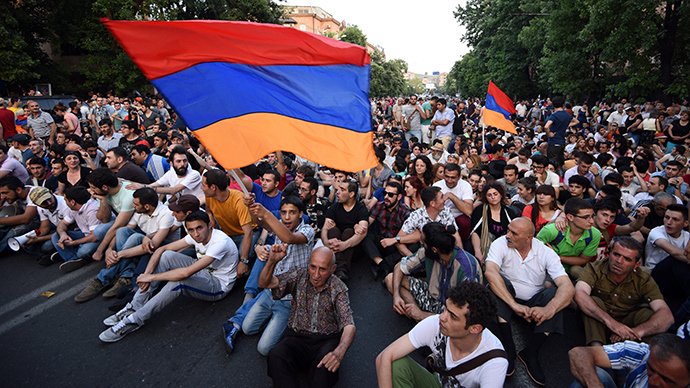
Protesters storm #Armenia's Parliament building after PM Nikol Pashinyan signed a deal with Azerbaijan to end Nagorno-Karabakh war. Deal came after Azerbaijan made significant advances in the region.#NikolPashinyan #NagornoKarabakh #Karabakh #Yerevanpic.twitter.com/onY1viuo44
— Wᵒˡᵛᵉʳᶤᶰᵉ Uᵖᵈᵃᵗᵉˢ𖤐 (@W0lverineupdate) November 10, 2020
Peaceful Assembly
Protests against peace agreement with Azerbaijan become anti-government
On 9th November 2020 a peace agreement was signed between Armenia and Azerbaijan in order to end the war in Nagorno Karabakh, which was previously documented on the Monitor. The document was signed by the president of Azerbaijan, Ilham Aliyev, and Armenian Prime Minister Nikol Pashinyan, and was countersigned by the president of the Russian Federation, Vladimir Putin, which mediated the peace negotiation process. Under the agreement, Nagorno Karabakh, a long-disputed region between Armenia and Azerbaijan, falls back under Azerbaijani legal jurisdiction.
Shortly after the peace agreement was signed, protests broke out in Yerevan, resulting in violence and the destruction of several government buildings, as people were dissatisfied with the territorial concessions made by Armenian authorities. Several public institutions were stormed, where furniture and other goods were destroyed. According to Radio Free Europe, thousands of protesters marched in Yerevan against the peace deal, asking for the resignation of Nikol Pashinyan and the withdrawal of the peace agreement. They were later joined by representatives of the opposition. The protests lasted for weeks, sparking a political crisis in Yerevan.
Over time, the protests became more numerous and in February 2021 the political situation worsened. On 25th February 2021, Pashinyan announced an attempt by the military to stage a coup. As a result, several thousand supporters of opposition parties took to the streets again to demand his resignation. Many of them spent the night in front of the parliament building, setting up tents and barricades. The protests continued almost daily, including in March 2021. The crisis ignited discussions between the country's president and prime minister, from which it was decided to hold early parliamentary elections. On 18th March 2021, an official announcement was made that early parliamentary elections will be held on 20th June 2021.
Demonstrations continued in Yerevan at the end of March 2021 as protesters continued to demand Pashinyan’s resignation.
Expression
Increased pressure on Armenian media reported during the pandemic and war in Nagorno Karabakh
In 2020, cases of physical violence against journalists increased in Armenia. In a press conference held on 26th January 2021, the Committee to Protect Freedom of Expression (CPFE) said that 2020 was a very intense year full of tests for media freedom, adding that this was due to the state of emergency imposed in connection with the coronavirus in Spring 2020. Also, media freedom and freedom of expression were affected by the war in Nagorno Karabakh, as the war created difficulties for journalists who were covering the conflict.
CPFE argued that the restrictions imposed by the government on media activities under the COVID-19 related state of emergency and martial law in the Nagorno Karabakh war were disproportionate. During the state of emergency the police simply sent notices to demand the removal of the publications, while in Nagorno Karabakh where martial law was applied, many publications received fines and penalties of between seven hundred thousand drams (USD 1,263) and 1.5 million drams (USD 2,706), along with demands to delete the content on their web pages. At least 32 notifications to remove publications were issued by the police, according to CPFE. Also, during the past year, media experts monitored six cases of physical violence against journalists: four cases were registered during opposition protests, two more were related to the targeting of journalists by Azerbaijan during the war. 177 cases of pressure on journalists were also documented, as 72 new court cases against journalists and media were registered, with most of them concerning insult and slander and the violation of the right to receive and disseminate information.
Defamation and insult fines increase threefold
On 24th March 2021, the Armenian parliament adopted new amendments to the Civil Code. Among the new regulations is increased fines for defamation and insult. A total of 76 deputies voted for the new proposals, 40 deputies voted against, and three people abstained. According to civil society experts, these changes will negatively impact freedom of expression and freedom of the press. Fines for defamation can now reach six million Armenian drams (USD 10,824), and for insult three million drams (USD 5,412), a threefold increase from previous legal provisions.
Earlier, on 15th March 2021, the Helsinki Citizens Assembly Vanadzor presented a statement describing their position on how the new provisions will affect freedom of expression and freedom of the press. The statement read in part:
"Criminalisation of slander and insult will inevitably affect freedom of the press, while the size of the fine and deprivation of liberty established by the draft will even cast doubt upon the activity and freedom of speech of the mass media."
Several civil society organisations called on the country's president, Armen Sarkisian, not to sign the law and demanded that the law be sent to the Constitutional Court to pronounce on the constitutionality of its provisions.
Association
New report Assesses Armenia’s civil society’s operating environment in 2020
The European Center for Not-for-Profit Law, in partnership with Transparency International Anticorruption Center (TIAC), released a report titled “Assessing the civil society environment in the eastern partner countries. Armenia Country Update 2020”. The study, which is conducted annually, presents the legal environment in which Armenian civil society operates. The report mentions certain changes to laws governing the activities of non-governmental organisations, such as the introduction of mandatory annual reporting for public organisations. Overall, while the report noted a slight deterioration in the situation of CSOs due to the imposition of restrictions associated with the pandemic, it also noted an increase in the number of active NGOs.